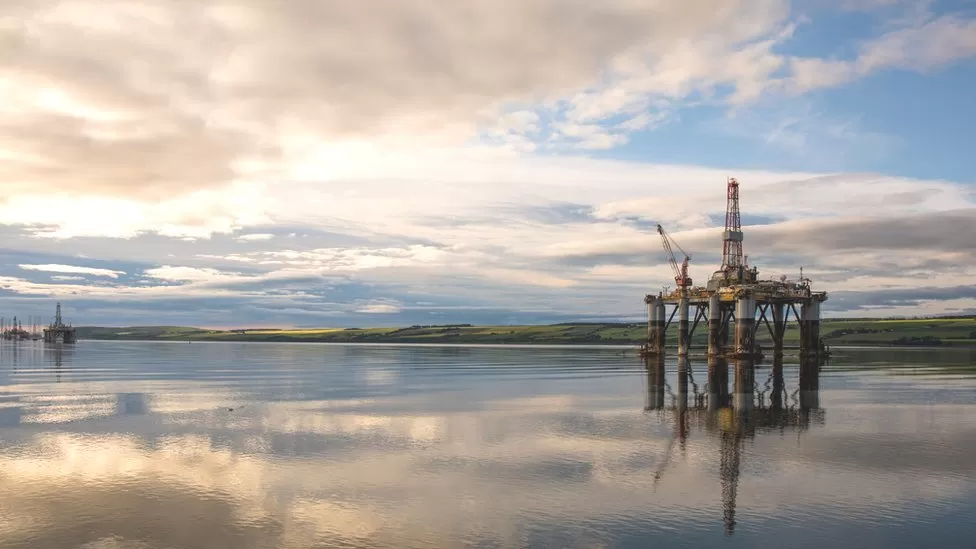
What is the windfall tax on oil and gas companies?
Report from: BBC News
The government is extending the windfall tax on oil and gas companies operating in the North Sea.
The levy was introduced in May but will now carry on for longer at a higher rate.
There had been calls to increase the tax after Shell and BP reported huge profits.
How much money have energy firms been making?
BP made $8.2bn (£7.1bn) worldwide between July and September, which was more than double its profit for the same period in 2021. It had made £6.9bn in the three months to June.
Shell announced worldwide profits of £8.2bn and £9bn for the same three-month periods.
Both companies have increased their dividend payments, which is the money they give directly to shareholders.
And they have been spending billions buying back their own shares from the market, in order to increase their value.
Shell and BP’s profits have been boosted by high oil and gas prices, exacerbated by Russia’s invasion of Ukraine. However, both companies say they have lost a lot of money as a result of stopping investments in Russian oil firms.
What is a windfall tax?
A windfall tax is a extra levy imposed by a government on a company.
The idea is to target firms which benefit from something they were not responsible for – in other words, a windfall.
Energy firms are getting much more money for their oil and gas than they were last year.
This is because demand increased when Covid restrictions were lifted. and the Ukraine war led to concerns about energy supply.
How does the new windfall tax work?
Rishi Sunak introduced the tax when he was chancellor, describing it as a 25% Energy Profits Levy.
In the Autumn Statement, Chancellor Jeremy Hunt announced this would increase to 35% from January 2023 and stay in place until March 2028. It had previously been scheduled to finish at the end of 2025.
The levy applies to profits made from extracting UK oil and gas, but not from other activities such as refining oil and selling petrol and diesel on forecourts.
Labour criticised the scheme because it also lets firms claim tax savings worth 91p of every £1 invested in fossil fuel extraction in the UK. That allowance will continue.
Mr Hunt said the tax will raise £40bn over six years.
The government has also introduced a temporary 45% levy on what it calls “extraordinary returns” from low-carbon electricity generators in the UK.
The Electricity Generator Levy will be paid from 1 January by larger generators. The government hopes it will raise about £14bn over six years.
How much will companies pay under the levy?
Shell has said it is not expecting to pay any of the windfall tax at all this year, as its investments in the North Sea meant it did not count as having made any UK profits.
It does expect to pay some in 2023.
BP said it would pay $800m (£678m) in windfall tax this year.
However, we don’t know exactly how much profit these companies are making from extracting oil and gas in the UK.
How much tax do oil companies usually pay?
Oil and gas firms operating in the North Sea are taxed differently to other firms.
Taxes on their profits are higher – they pay 30% corporation tax on their profits and a supplementary 10% rate on top of that. Other firms currently pay corporation tax at 19%.
But oil and gas firms have been able to reduce the amount of tax they pay by factoring in losses or spending on things like decommissioning North Sea oil platforms.
In recent years, such methods have meant that BP and Shell, for example, have paid almost no tax in the UK.
BP and Shell both received more money back from the UK government than they paid every year from 2015 to 2020 (except 2017, when Shell paid more than it received).
Shell also paid a negative amount of tax in 2021, taking its total since 2015 to -£685m of tax in the UK.
BP paid more than it received in 2021, taking its total since 2015 to -£107m.
Will the windfall tax affect investment in oil and gas?
BP plans to spend a maximum of £18bn on the UK’s energy system by the end of 2030.
In May 2022, BP chief executive Bernard Looney told the Times newspaper that all of the company’s planned UK investments would carry on regardless of any windfall tax.
Mr Looney replied: “There are none that we wouldn’t do.”
Shell plans to spend between £20bn and £25bn on UK energy over the next 10 years.
Search the Blog
Oops! We could not locate your form.